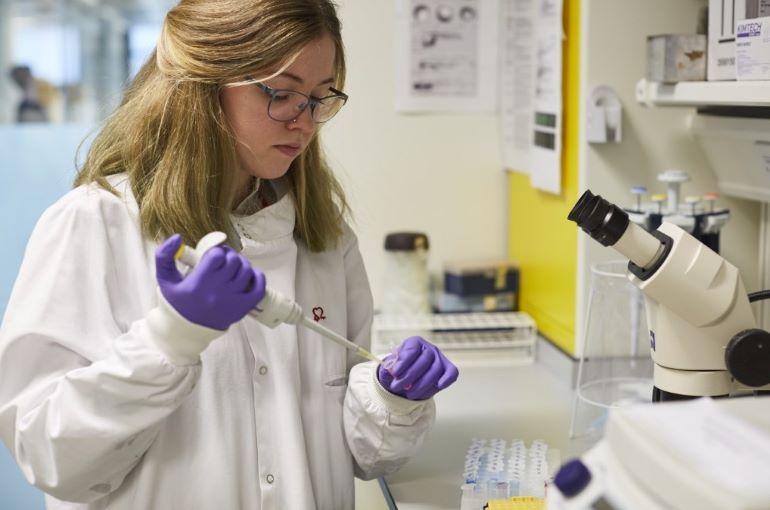
When the BHF was founded in 1961, very little research was being done into heart and circulatory diseases. We set about changing that. One of our first aims as a new charity was to appoint BHF-funded Professors across the UK, each internationally recognised for their research, who would build talented teams around them and create a solid foundation for the future. Over our 60 years there have been more than 80 BHF Professors, and there are currently 29, who are all among the leading experts in their fields.
Supporting new researchers
After appointing the first BHF Professors, the BHF then considered how to help young researchers start their careers, and how to develop them as they progressed their research – including supporting the brightest and best towards becoming the next generation of BHF Professors. We introduced research fellowships in the 1960s and PhD studentships in 1981. Since 1990 we’ve supported the training of nearly 2,000 PhD students throughout the UK, as well as granting more than 430 Fellowships to researchers, who can be at an early or advanced phase of their career.
Sharing expertise
The impact of this support extends far beyond the researcher receiving the grant. We encourage a culture of mentorship, where knowledge and experience is passed down from research leaders to their trainees and junior colleagues: for example five of the BHF's first ten professors trained another ten future BHF Professors, as well as many other researchers.
Professor Peter Sleight, the BHF’s first Professor of Cardiovascular Medicine at the University of Oxford, (a post he held for over 20 years from 1973), was a shining example of nurturing future talent. Professor Sleight led a series of clinical trials, beginning in the early 80s, which transformed the way that people are treated after a heart attack.
Two of his young researchers were Rory Collins and Salim Yusuf. Rory Collins is now BHF Professor of Medicine & Epidemiology, and was appointed Sir Rory Collins in 2011 for his contributions to research, including leadership of UK Biobank, the world’s largest detailed population study of health and disease. Professor Yusuf is now a world-leading expert in population health and cardiovascular risk, heading his Institute at McMaster University, and received the Order of Canada (the country’s second highest honour) in 2013.
Supporting the brightest and best
Many of our researchers have had BHF support throughout their research career in the UK. Some of our current researchers have been funded by us for the last 30 years, and have gained an international reputation in this time, making many important discoveries that might never have happened without BHF support.
For example, Dr Anna Dominiczak at the University of Glasgow was first funded by the BHF in 1990, when we gave her a grant to gain experience in the study of hypertension at the University of Michigan. We funded her for the next 20 years, including as a BHF Professor from 1998 to 2010. She led the creation of the BHF Centre for Research Excellence in Glasgow in 2006 before becoming the university’s Vice Principal and head of Medical, Veterinary & Life Sciences. She was made a Dame in 2010 for her services to medical research.
As well as supporting entire research careers, BHF funding has also helped attract exceptional talent from overseas. For example, Professor Kinya Otsu is one of the world’s leading experts in research into the mechanisms that cause cell death during heart failure. He spent 20 years at Osaka University in Japan, before moving to London to take up a position as BHF Professor of Cardiology at the BHF Centre of Research Excellence, King’s College London.
BHF Professor Ziad Mallat is one of the world’s leading researchers in atherosclerosis (the build-up of fatty material in your arteries) and in abdominal aortic aneurysms. His research career was based in Paris until he moved to the University of Cambridge in 2010 to become BHF Professor of Cardiovascular Medicine.
What’s next?
While we’re incredibly proud of the talent we’ve helped nurture, we still need to do more to increase diversity in the research workforce. Women are under-represented in medical research, particularly among senior researchers. To begin to improve this imbalance, since 2015 we have ensured that researchers who work part-time are eligible for almost all of our fellowship grants, and we publicise this in information for researchers on our website. This helps to improve diversity, as flexible working patterns can help to attract more female applicants. We have also created career re-entry awards to encourage applicants who have taken a break from research to return to the lab to re-establish a career in cardiovascular science.
In 2019 we opened up our research opportunities to people from different healthcare backgrounds, so that nurses and healthcare professionals (including midwives, paramedics, dietitians, radiographers and physiotherapists) could lead research. These professionals are on the frontline of healthcare and have an in-depth understanding of individual patient needs and experiences, and how clinical services could be improved to help patients and carers. It also broadens the pool of research talent so that more people can contribute to cardiovascular research.
Our next priority is to encourage and retain researchers from ethnic minority backgrounds.
Finally, as an immediate response to the Covid-19 pandemic and despite a substantial drop in income, we have supported grant extensions to our current PhD students to ensure that they can complete their work successfully. Putting this in jeopardy would have a knock-on effect with a dearth of talent for the development of future leaders in research into heart and circulatory diseases.
First published 16 June 2021


